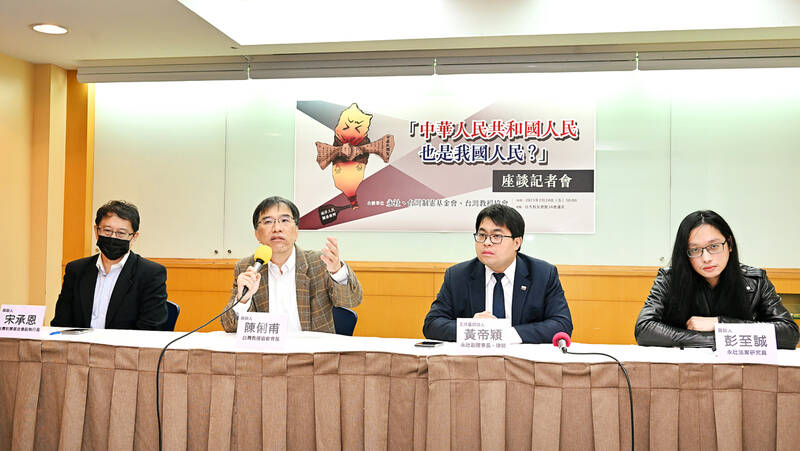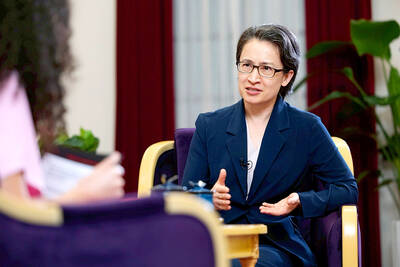Taiwan’s outdated Constitution led to a controversial court ruling last week granting compensation to the family of a Chinese citizen who died in Taiwan, a panel of experts said yesterday.
The High Court on Friday last week ruled that state compensation should be paid for the accidental death of a Chinese tourist surnamed Qian (錢), who was electrocuted by a malfunctioning street light while cycling in Kaohsiung’s Lujhu District (路竹) in August 2018.
The ruling was made on the basis that citizens of the People’s Republic of China are considered citizens of the Republic of China under law, and therefore should be compensated under the State Compensation Act (國家賠償法).

Photo: Tien Su-hua, Taipei Times
Members of the Taiwan Forever Association, the Taiwan New Constitution, the Taiwan Association of University Professors and other groups during a joint news conference in Taipei yesterday said that the judge made an interpretation that deviated from common understanding of the Constitution.
“The controversy surrounding the judgement highlights the longstanding problem of the unclear status of Chinese in our country’s laws,” the groups said.
“If the people of the mainland area are to be considered citizens of the Republic of China, then will the government distribute NT$6,000 to all 1.4 billion people in China?” Taiwan Forever Society chairman Huang Di-ying (黃帝穎) asked, referring to tax rebates that the government is planning to issue this year.
The ruling highlights the need to amend the Constitution “as soon as possible,” he said, adding that the State Compensation Act should also be amended to “prevent judges from misinterpreting Chinese as the court’s subjects.”
Taiwan Forever Association researcher Peng Chih-cheng (彭至誠) said the ruling was partially related to the wording of the Act Governing Relations Between the People of the Taiwan Area and the Mainland Area (臺灣地區與大陸地區人民關係條例).
That act “omits provisions related to national compensation, thereby making it easy for those who apply the law to submit legal interpretations that are divorced from reality but seem legal,” Peng said.
The issue is not a question of Taiwanese not wanting to compensate Chinese in such cases, but a matter that represents a crisis in the constitutional framework, Taiwan Association of University Professors deputy chairman Chen Li-fu (陳俐甫) said.
Aside from compensation, the issue also could affect tax, military service and criminal laws, among others, he said.
The world recognizes the “status quo” in the Taiwan Strait as meaning that Taiwan and China are separate, and the High Court’s ruling confused the issue, Taiwan New Constitution Foundation deputy director Song Cheng-en (宋承恩) said.
“How should Taiwan seek assistance from other countries during an invasion attempt by China if such rulings are made?” he asked.

Temperatures in northern Taiwan are forecast to reach as high as 30°C today, as an ongoing northeasterly seasonal wind system weakens, the Central Weather Administration (CWA) said. CWA forecaster Tseng Chao-cheng (曾昭誠) said yesterday that with the seasonal wind system weakening, warmer easterly winds would boost the temperature today. Daytime temperatures in northern Taiwan and Yilan County are expected to range from 28°C to 30°C today, up about 3°C from yesterday, Tseng said. According to the CWA, temperature highs in central and southern Taiwan could stay stable. However, the weather is expected to turn cooler starting tonight as the northeasterly wind system strengthens again

The Ministry of Foreign Affairs (MOFA) yesterday expressed “grave concerns” after Singaporean Prime Minister Lawrence Wong (黃循財) reiterated the city-state’s opposition to “Taiwanese independence” during a meeting with Chinese Premier Li Qiang (李強). In Singapore on Saturday, Wong and Li discussed cross-strait developments, the Singaporean Ministry of Foreign Affairs said in a statement. “Prime Minister Wong reiterated that Singapore has a clear and consistent ‘one China’ policy and is opposed to Taiwan independence,” it said. MOFA responded that it is an objective fact and a common understanding shared by many that the Republic of China (ROC) is an independent, sovereign nation, with world-leading

COOLING OFF: Temperatures are expected to fall to lows of about 20°C on Sunday and possibly 18°C to 19°C next week, following a wave of northeasterly winds on Friday The Central Weather Administration (CWA) on Sunday forecast more rain and cooler temperatures for northern Taiwan this week, with the mercury dropping to lows of 18°C, as another wave of northeasterly winds sweeps across the country. The current northeasterly winds would continue to affect Taiwan through today, with precipitation peaking today, bringing increased rainfall to windward areas, CWA forecaster Liu Pei-teng (劉沛滕) said. The weather system would weaken slightly tomorrow before another, stronger wave arrives on Friday, lasting into next week, Liu said. From yesterday to today, northern Taiwan can expect cool, wet weather, with lows of 22°C to 23°C in most areas,

DEFENDING FREEDOM: Taiwanese love peace and helping others, and hope to be a positive force in the world, Vice President Hsiao Bi-khim told ‘Weltspiegel’ Taiwan is making every effort to prevent war in the face of China’s hybrid coercion tactics and military threats, Vice President Hsiao Bi-khim (蕭美琴) said in an interview with German public broadcaster ARD’s program Weltspiegel that aired on Monday. Taiwan is not seeking provocation or intending to disrupt international order, but “must possess the capacity for self-defense,” a news release issued by the Presidential Office yesterday quoted her as saying. Taiwan is closely watching not only the increasing scope and frequency of Chinese military exercises around the nation, but also Beijing’s hybrid and cognitive warfare tactics, including manipulating public opinion, fostering